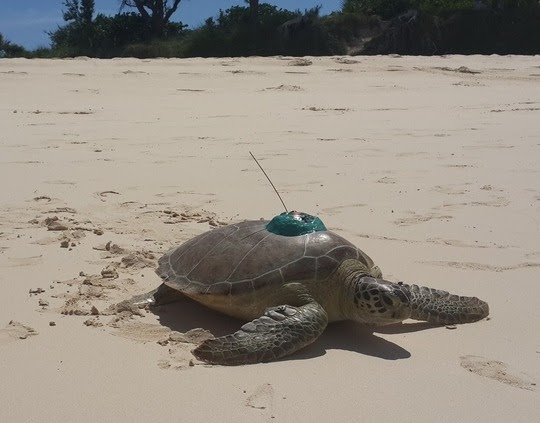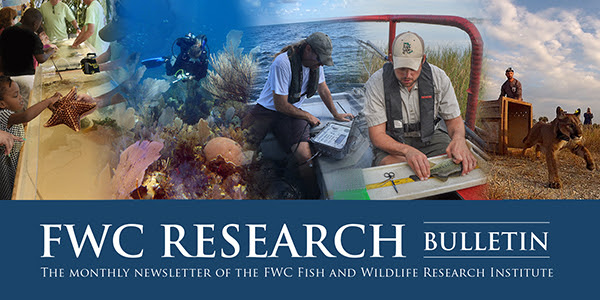FWRI Celebrates International Day of Women and Girls in ScienceWe take immense pride in the fact that 56% of FWRI research staff positions are held by women. Join us in recognizing our remarkable women in science, whose dedication and expertise are instrumental to shaping our research and conservation efforts. Get inspired and dive deeper into their journeys and accomplishments by checking out our Women in Science Flickr album.  Atlantic Sturgeon CollectionOur Fish Kill Hotline received a report of a dead sturgeon along the banks of the St. Johns River outside of Jacksonville. Our researchers arrived on the scene and identified the specimen as an Atlantic Sturgeon (Acipenser oxyrinchus oxyrinchus), a federally endangered species, which makes it a rare find!
The Atlantic sturgeon inhabits both salt and freshwater habitats, cycling between the two. Some migrate into brackish and saltwater during the fall and feed there throughout the winter months before heading back into freshwater rivers during the spring, while others may remain at sea for years. Sturgeon spawn in rivers and typically return to their native spawning grounds when they mature. In Florida, the Atlantic sturgeon can be found in the St. John’s River, but the species can be found along the east coast all the way north to Canada! If you find a stranded, injured, or dead sturgeon, please report it to NOAA Fisheries at (844) 788-7491 or send them an email at noaa.sturg911@noaa.org. If you observe a fish kill, please report it to our Fish Kill Hotline at 800-636-0511 or through the report form on our web page. 
Green Sea Turtle Telemetry Publication
Green turtles (Chelonia mydas) are long-lived marine megaherbivores known for their extensive movements across ocean basins during their lifetimes, but they also exhibit remarkable site fidelity by returning to specific nesting and foraging sites. To learn more about the movements and habitat use of juvenile green turtles in benthic development habitat, a team of researchers deployed GPS-enabled satellite transmitters on 16 individuals in Bermuda. They collected an average of 562 GPS positions per turtle over an average of 284 tracking days, using this information to characterize residence areas, distinct use areas within them, and seasonal movements.
Over the 8-year study period, the total residence area of the turtles significantly increased, coinciding with a decline in seagrass and indicating a necessary increase in foraging effort. Most turtles traveled daily between foraging and resting sites, with some individuals passing through commonly used vessel channels. The study also revealed seasonal variations in behavior, suggesting some turtles utilize an overwintering strategy involving “optional dormancy.” Additionally, some turtles made direct "developmental" migrations toward known adult foraging ranges.
These findings contribute to a better understanding of the green sea turtle life cycle, particularly at high latitude sites. The identification of distinct use areas sheds light on their behavioral and movement patterns, as well as their reliance on specific habitats for different activities. This knowledge can be used to inform future conservation decision-making and guide long-term monitoring projects.
FWC relies on peer-reviewed science for its management; click here to access this full publication. 
Steidinger Scholars Summer 2024 Applications
Applications to work with our fish and wildlife health, freshwater fisheries, harmful algal bloom, and crocodile research and management teams are now open!
The Steidinger Scholars program offers a 3-month part- to full-time paid internship, providing students with valuable hands-on experience in fisheries and wildlife research, and is open to recent high school graduates or new college students of all genders and from all backgrounds, cultures, and experiences. Throughout the program, you will receive mentorship from FWRI scientists and work independently on projects focused on the protection, management, and conservation of Florida’s fish and wildlife resources. Explore the career of a lifetime! Applications will close on March 6th! For more information on the program, current openings, and how to apply you can visit our webpage. Interested in other opportunities to work with FWRI? Visit out internships page. 
Triple Manatee Release
More rehabilitated manatees are being returned to their natural habitat! Rescued as calves, these manatees have been under the care of MRP Manatee Partners at ZooTampa and SeaWorld and are ready to return to the wild!
Manatees rescued at a young age are released at warm water sites to give them the opportunity to learn the importance of this vital refuge from the other manatees that have gathered for the winter. Additionally, they have been equipped with telemetry devices that allow researchers to closely monitor their movements to ensure their successful transition back into the wild. During the release, we were lucky enough to capture a manatee "squeak" as they swam away - watch until the end to hear it for yourself! New on MyFWC.com/ResearchWe hope you enjoy these articles that have been recently added/updated on our website: Red Tide Current Status
Red Tide-Related Hotlines and Information Sources
2024 Manatee Mortalities
Annual Rescue Summaries [Manatee]
Marine Mammal Publications
New Publications
Internship Opportunities Our MissionThrough effective research and technical knowledge, we provide
timely information and guidance to protect, conserve, and manage
Florida's fish and wildlife resources. | 






No comments:
Post a Comment